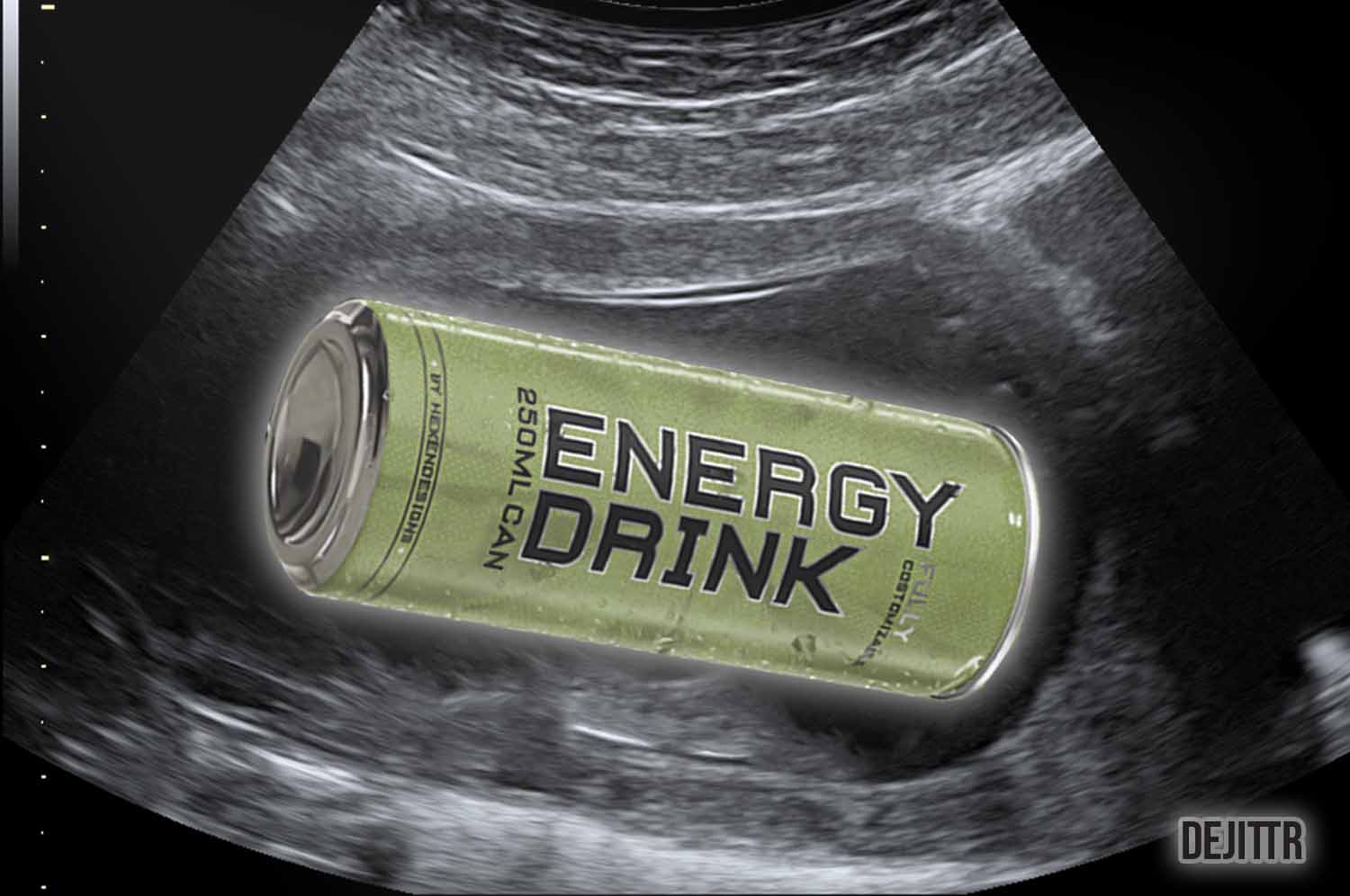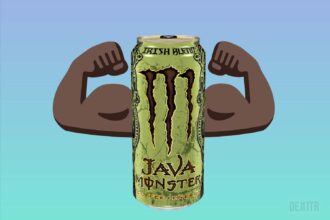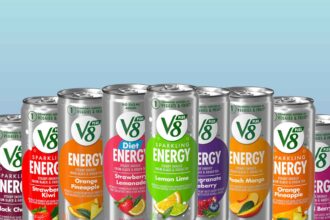Whether consuming energy drinks while pregnant is safe or not is debated. The truth is that not so much is known about the mechanisms potentially dangerous for the fetus since it’s difficult to conduct medical studies on the effects of any substances on pregnant women.
Caffeine While Pregnant
The main point about the consumption of energy drinks while pregnant is the amount of caffeine.
Caffeine is one of the most consumed stimulants worldwide, and it is found in a variety of foods and beverages, such as coffee and energy drinks, and also in some medications.
Key Takeaways:
Overall, it appears that low to moderate caffeine intake does not increase any risk for the baby. According to various scientific studies, and as recommended by the World Health Organization and the American College of Obstetrics and Gynecology, a daily caffeine consumption below 200 mg during pregnancy is safe.
The amount of caffeine in foods and drinks varies a lot. It varies even between the different coffee drinks, depending on the type of beans or leaves, the manufacturer, the preparation, and the size.
This table shows the most common sources of caffeine.
| SOURCE | UNIT | CAFFEINE PER UNIT (mg) |
| Coffee | ||
| • Brewed | 1 cup, 8 oz | 135 |
| • Instant | 1 cup, 8 oz | 75–105 |
| • Decaffeinated | 1 cup, 8 oz | 2-15 |
| Coffee Icecream | 4 oz | 2 |
| Energy Drinks | ||
| Monster Energy | 16 fl oz can | 160 |
| Red Bull | 8.4 fl oz can | 80 |
| Tea | ||
| • Black tea | 1 cup, 8 oz | 45 |
| • Green | 1 cup, 8 oz | 30 |
| Soft drinks | ||
| • Cola | 1 can, 12 oz | 30–45 |
| • Light cola | 1 can, 12 oz | 40–50 |
| Cocoa products | ||
| • Chocolate milk | 1 cup, 8 oz | 5-8 |
| • Dark chocolate | 1.45 oz bar | 30 |
| • Milk chocolate | 1.55 oz bar | 11 |
| Chocolate syrup | 1 tablespoon | 3 |
Can I Drink Energy Drinks While Pregnant?
Generally, drinking energy drinks when pregnant it’s not really recommended. In fact, on many of them, there’s a warning on the label that advises against drinking them during pregnancy.
The main reason for that is the high content of caffeine and sugar.
Even so, drinking an energy drink occasionally is not going to cause any problems. If you are going to drink energy drinks during pregnancy, you should pay close attention to the ingredients on the label and choose one with a moderate amount of caffeine and sugar.
An 8.4 fl. oz can of Red Bull contains 80mg of caffeine, 27g of sugar, and 110 calories. Even if it is not a healthy option, the amount of caffeine is moderate, and drinking a can is unlikely to be risky for a pregnant woman.
A 16 fl. Oz can of Monster Energy (the can is double of a Redbull can) contains 164 milligrams of caffeine, 54.2 grams of sugar, and 233 calories. As a result, if you drink just one can of Monster Energy, you are consuming an excess of sugar and a considerable amount of caffeine.
In the market, you can find some energy drinks with a very sensible amount of caffeine, like Reize with only 50 mg of caffeine, or even caffeine-free energy drinks, that are the best option in this case.
However, if you are pregnant, you might want to reconsider drinking any kind of energy drink, since you should limit not only caffeine, but also sugar, artificial sweeteners, and other ingredients.
Energy Drink Ingredients to Avoid While Pregnant
Let’s have a look at the ingredients and nutritional values that represent a problem for the pregnancy and should be avoided:
- Caffeine: It’s well known that can increase alertness and, in large amounts, can lead to, anxiety, restlessness, sleeping difficulties, dehydration, and increased heart rate and blood pressure, which should be avoided during pregnancy.
Besides that, caffeine does pass across the placenta from mother to fetus, which is less able to break down caffeine than an adult. It means that the caffeine ingested by the mother may remain in her baby’s system for a longer period. Moreover, it may increase the risk of low birth weight.
- Sugar: According to the Harvard School of Public Health, the average energy drink has more sugar than a 12oz can of cola. It’s known that a diet high in sugar can increase the risk of gestational diabetes, preeclampsia, and birth defects.
- Artificial Sweeteners: some energy drinks are zero or low-calorie because the sugar is replaced with artificial sweeteners. Some of them are approved by the Food and Drug Administration (FDA), such as Acesulfame-K, Aspartame, Neotame, Saccharin, Sucralose, and Stevia.
It seems most of them are ok during pregnancy, but not so much is known, so it’s better to limit artificial sweeteners in general. One of them that should be avoided while pregnant is saccharin, because of its carcinogenic effect.
- Taurine: is an essential amino acid that is naturally found in animal-based foods, and it is also present in breast milk.
Even if it is considered safe when consumed in food that naturally contains it, not so much is known about the effects of taurine when added to drinks, since taurine supplements can affect metabolism and kidney function, it’s better to avoid taurine during pregnancy. - B Vitamins: often, energy drinks contain B vitamins in higher doses than recommended. When consumed in excess, side effects may occur, such as flushing and increased heartbeat.
Pregnant women often take vitamin supplements, so it’s best to avoid additional amounts of them. - Other ingredients: energy drinks are not regulated by the FDA, and they may contain other dangerous ingredients that are not listed on the label!
Is Natural Caffeine Like Guarana Ok During Pregnancy?
Guarana contains a large amount of caffeine, which depends on the presentation (powder, tablet, drink). A guarana supplement in a tablet may contain up to 200 mg of caffeine.
Guarana is possibly safe during pregnancy, but only if consumed in small amounts. Taking guarana in high doses is equivalent to drinking a lot of coffee, and it’s not recommended.
There are caffeine-free natural energizing herbs, like ginseng or ginkgo Biloba. However, since studies about their consumption in pregnancy are limited, it is prudent to avoid these options as well.
Does Trimester Matter When Consuming Energy Drinks?
In general, the first trimester is the most delicate for the development of the baby, so it’s even more recommended to avoid energy drinks and not exceed the daily caffeine intake during this period.
With respect to the 2nd trimester, there are some reassuring findings for pregnant women who want to drink caffeine beverages.
A cohort study of 2802 pregnant women demonstrated that low and moderate caffeinated beverage intake (less than 200 mg per day) during the second trimester was associated with a lower risk for gestational diabetes, lower glucose levels at gestational diabetes screening, and more favorable cardiometabolic profile compared with no consumption.
Can Energy Drinks Cause Harm While Pregnant?
Even a single energy drink is unlikely to cause harm, they contain caffeine, and scientific studies do suggest that caffeine in excess can increase the chances of complications and pathologies.
Energy drinks like Red Bull and Monster Energy are associated with many adverse cardiovascular outcomes, that can have an impact on pregnancy.
According to many findings from observational studies, maternal caffeine consumption from any source is reliably associated with major negative pregnancy outcomes.
Caffeine in pregnant women has been associated with different problems in the baby:
- low birth weight and anthropometric measurements
- increased risk of heart disease
- fetal growth restriction
- stillbirth
Also, it has been shown that the caffeine amount consumed increases the risk.
Can Caffeine Cause a Miscarriage?
Whether caffeine causes miscarriages or not is debatable. Some studies prove it, and other demonstrates the opposite.
We can say that caffeine does not primarily cause miscarriages, and miscarriages don’t necessarily happen due to the consumption of energy drinks, even if they can be a contributing risk factor, especially when consumed daily.
Although some studies have found a link between caffeine consumption and an increased risk of miscarriage, most evidence suggests that a direct correlation has not been proven.
Energy drinks are commonly consumed, and miscarriage is a common event, and it’s not clear how their consumption can really affect the possibility of this event.
The American College of Obstetricians and Gynecologists has stated that high caffeine content is not the major contributing factor to miscarriages.
Similarly, the Organization of Teratology Information Specialists has stated that caffeine in low to moderate levels, 150 to 200 mg, does not cause miscarriages.
Craving Energy Drinks While Pregnant
Some people develop an addiction to energy drinks. It means they drink an excessive amount of them, and they feel they lose control of their intake.
Caffeine, sugar, and artificial sweeteners are potentially addictive substances. When abstaining from energy drinks, it’s possible to experiment with cravings.
Other withdrawal symptoms may appear, like headaches, irritability, and fatigue. This is related to a neurological response of dopamine release in the brain, and psychological addiction as well.
If you are craving energy drinks, you should develop a strong motivation and quit them, by either stopping cold turkey or reducing them gradually.
Start to drink safe alternatives to energy drinks and manage your stress levels with relaxation techniques, meditations, and breathing exercises.
This process may be hard. If you find it very challenging, you can consider seeking support from a healthcare provider, since there’s a large mental component and working on it guided by a professional is easier.
Safe Energy Drink Substitute During Pregnancy
When pregnant, it’s understandable to feel tired, sometimes exhausted, particularly during the first trimester. To get out of this unpleasant state of fatigue, there are many ways that do not include caffeine.
Going caffeine free for a while and not being dependent on caffeine as your energy booster should be your objective.
After some days without caffeine, you’ll feel calmer, more alert, and lucid, and you may no longer crave energy drinks. Here are some substitutes and tips:
- Eating healthy and nutritious food full of complex carbs, healthy fats, and protein will minimize any blood sugar spikes that can result in more tiredness afterward. Remember you’re allowed an extra 300 calories a day when pregnant.
- Smoothies are refreshing, nourishing, and energizing. Using greens, bananas, tropical fruits, beets, and nuts or seeds will give you a lot of energizing nutrients in one shot.
- Fruit juices and vegetable juices are other great options. If you don’t want to make them at home and you buy them, be sure their sugar content is not high and that the pulp is included to increase the fiber content.
- Hydrate more: drink a lot of water during the day. You can add some mint, cucumber, lemon juice, and other fresh flavors to it. It doesn’t have to be boring water. Dehydration can make you feel tired.
If your energy levels are always low or you’re experiencing extreme tiredness often, it’s best to first consider your sleep habits and go to your doctor to talk about the supplement you may take and to make sure there are no underlying conditions such as anemia.
Conclusion
To summarize, it’s best to avoid energy drinks at all during pregnancy, because they usually contain high amounts of caffeine, which may be harmful in high quantities.
On top of that, they contain many other added ingredients like sugar, sweeteners, and vitamins, that can potentially be dangerous for the mother and the baby.
Even then, drinking an energy drink occasionally is not likely to cause harm, especially if it is one with a moderate amount of caffeine and sugar.
If you drank an energy drink before realizing it, don’t panic, because the risks for the pregnancy are minimal.
However, it’s best to stop drinking them, put caffeine on hold, and start to drink healthy smoothies habitually for the duration of your pregnancy.













